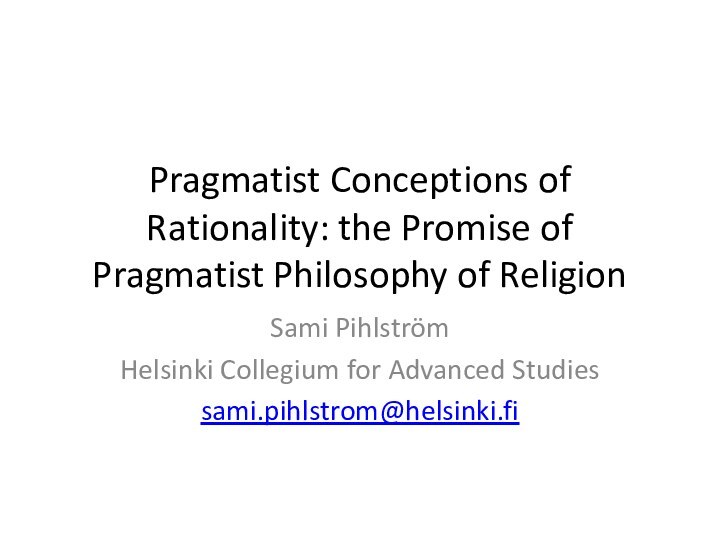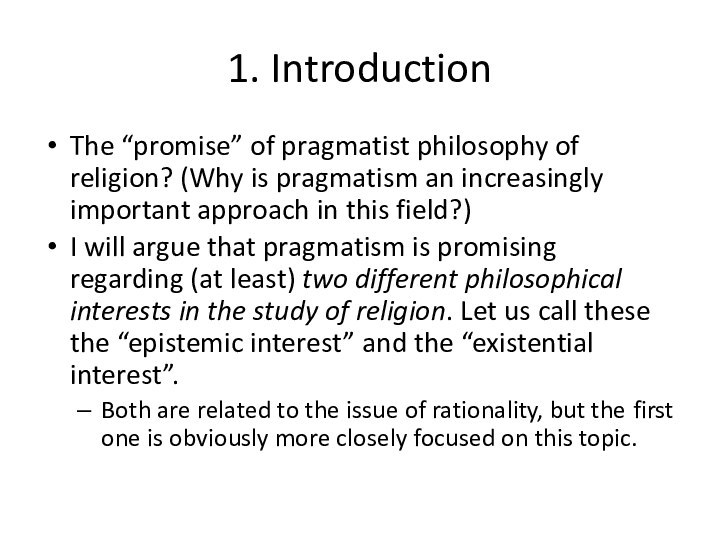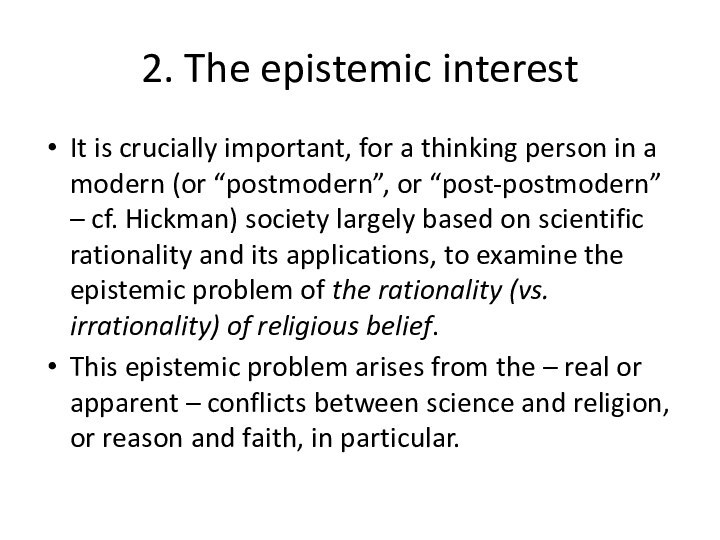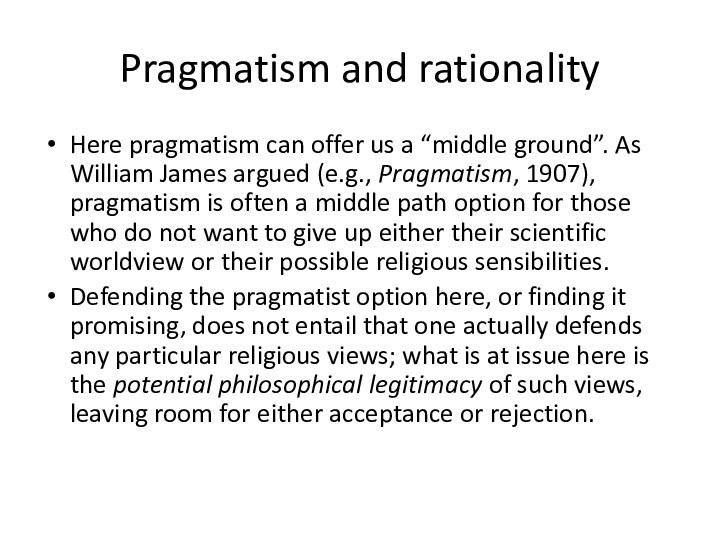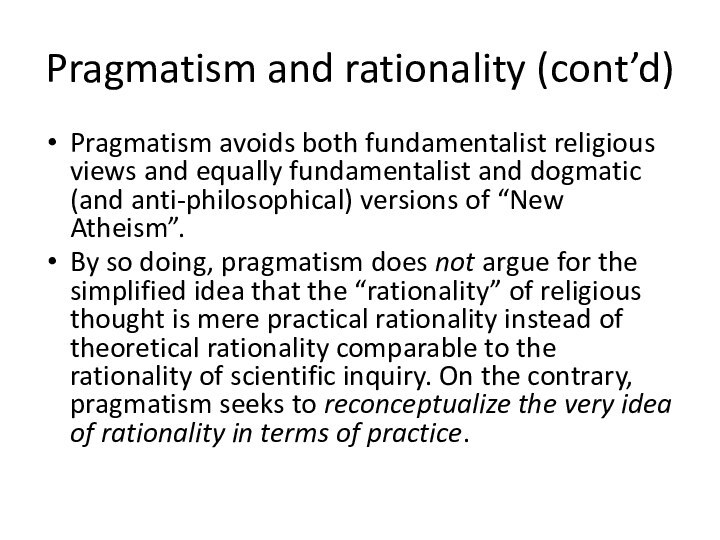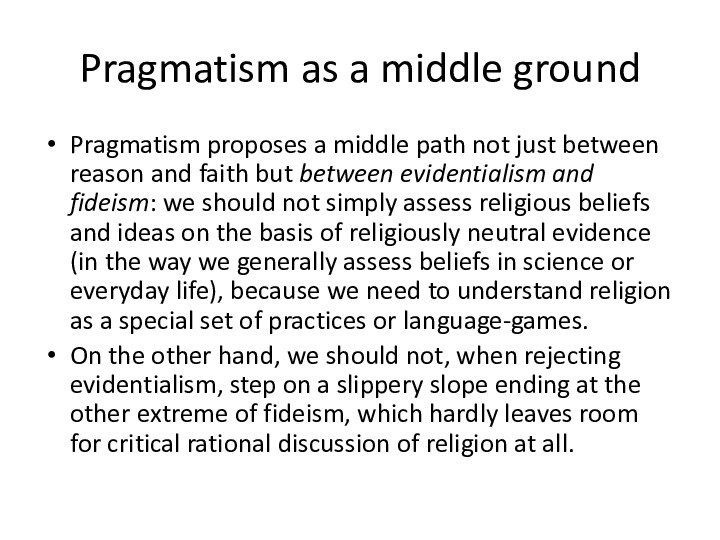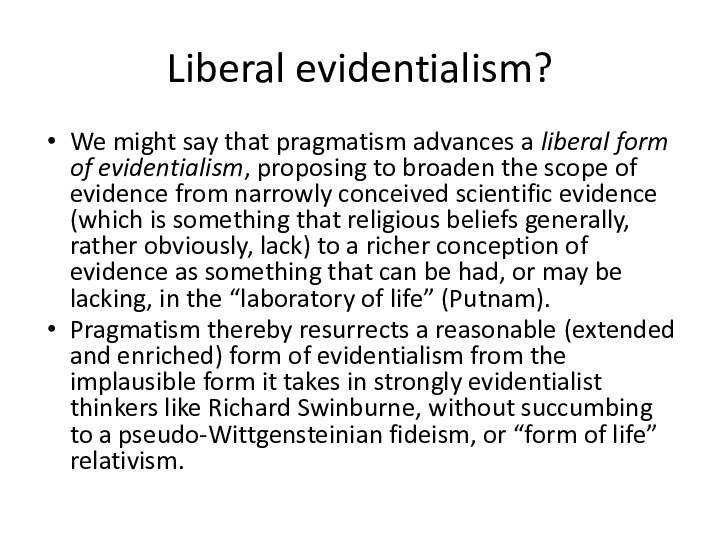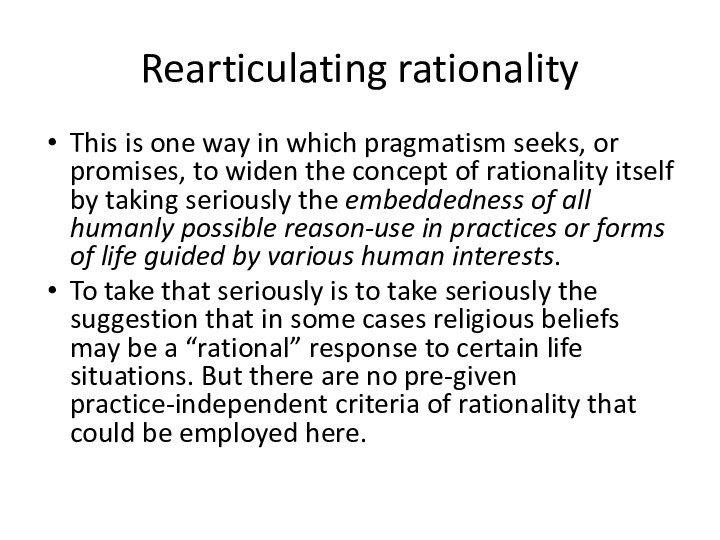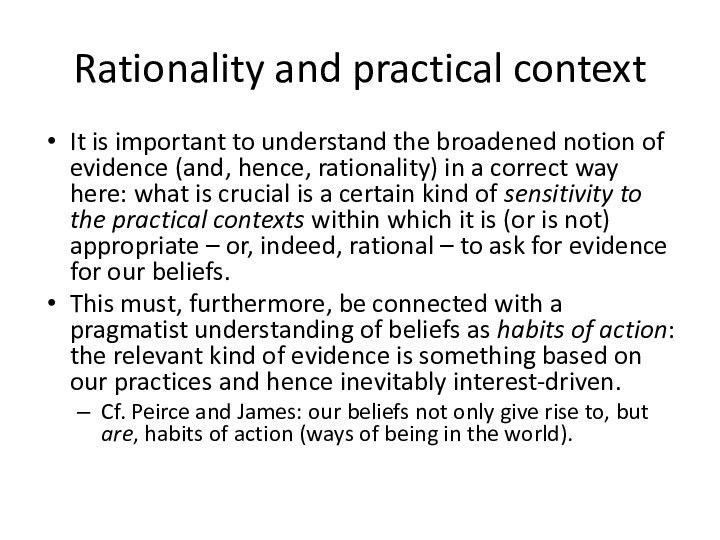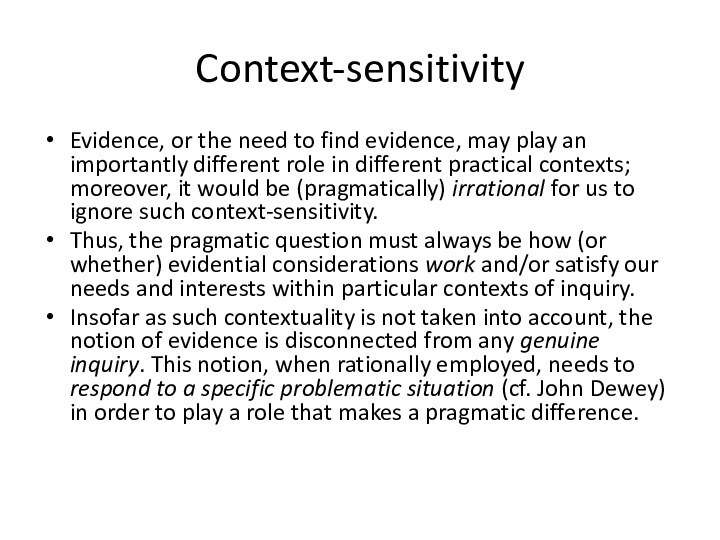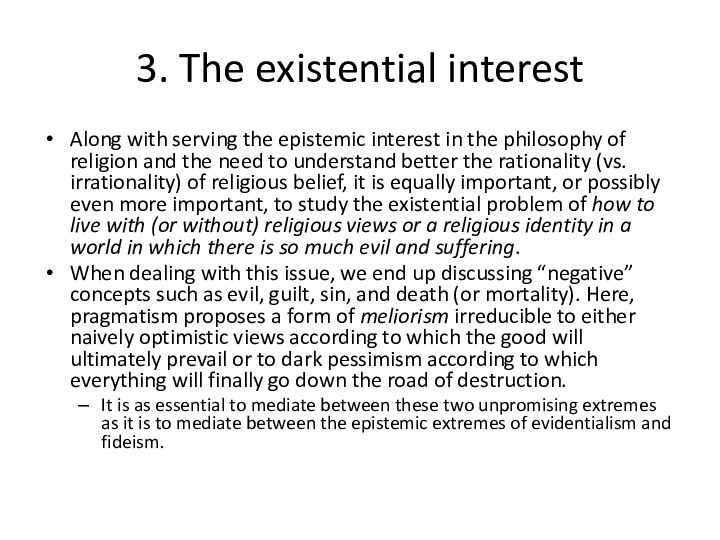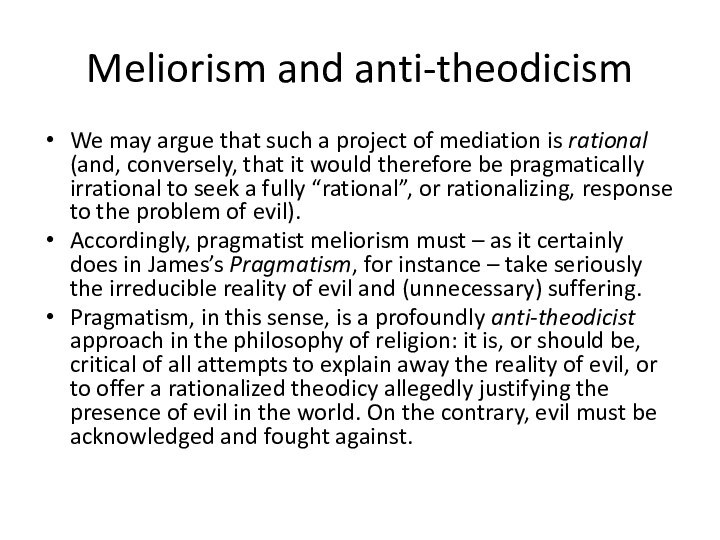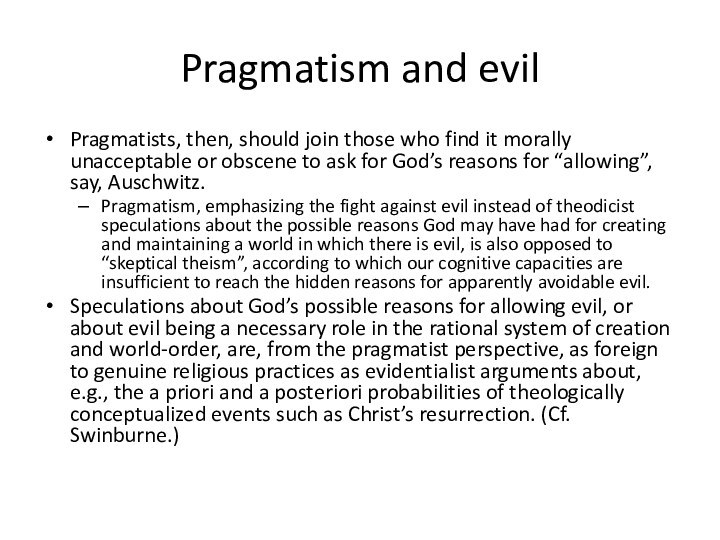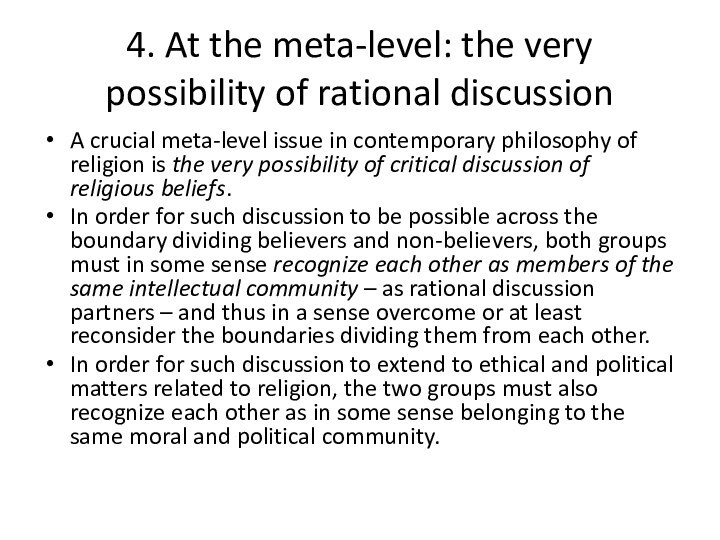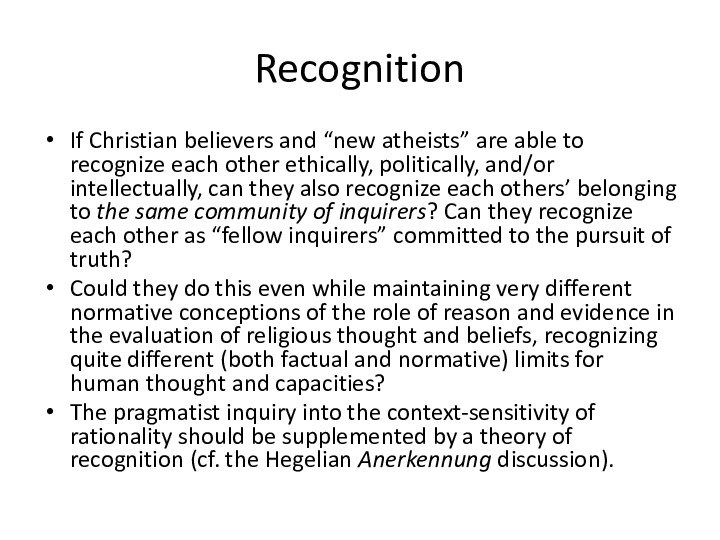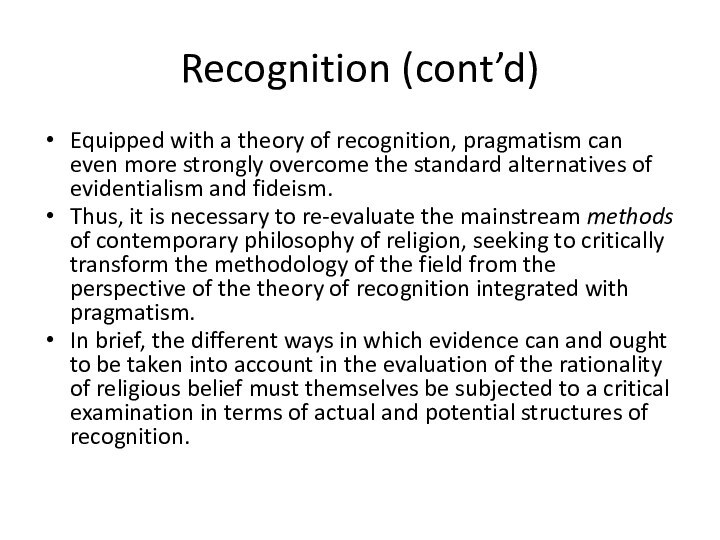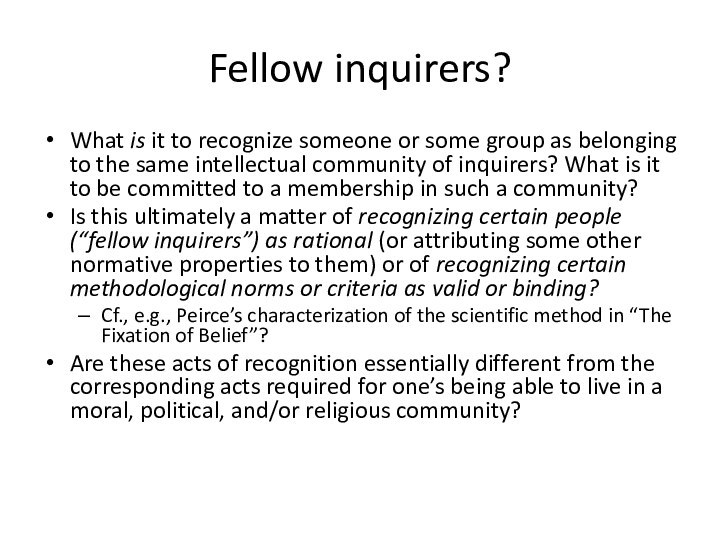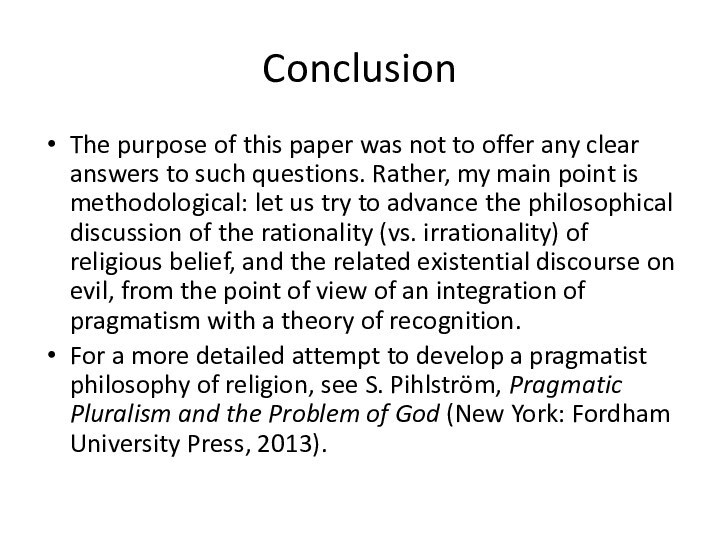Слайд 2
1. Introduction
The “promise” of pragmatist philosophy of religion?
(Why is pragmatism an increasingly important approach in this
field?)
I will argue that pragmatism is promising regarding (at least) two different philosophical interests in the study of religion. Let us call these the “epistemic interest” and the “existential interest”.
Both are related to the issue of rationality, but the first one is obviously more closely focused on this topic.
Слайд 3
2. The epistemic interest
It is crucially important, for
a thinking person in a modern (or “postmodern”, or
“post-postmodern” – cf. Hickman) society largely based on scientific rationality and its applications, to examine the epistemic problem of the rationality (vs. irrationality) of religious belief.
This epistemic problem arises from the – real or apparent – conflicts between science and religion, or reason and faith, in particular.
Слайд 4
Pragmatism and rationality
Here pragmatism can offer us a
“middle ground”. As William James argued (e.g., Pragmatism, 1907),
pragmatism is often a middle path option for those who do not want to give up either their scientific worldview or their possible religious sensibilities.
Defending the pragmatist option here, or finding it promising, does not entail that one actually defends any particular religious views; what is at issue here is the potential philosophical legitimacy of such views, leaving room for either acceptance or rejection.
Слайд 5
Pragmatism and rationality (cont’d)
Pragmatism avoids both fundamentalist religious
views and equally fundamentalist and dogmatic (and anti-philosophical) versions
of “New Atheism”.
By so doing, pragmatism does not argue for the simplified idea that the “rationality” of religious thought is mere practical rationality instead of theoretical rationality comparable to the rationality of scientific inquiry. On the contrary, pragmatism seeks to reconceptualize the very idea of rationality in terms of practice.
Слайд 6
Pragmatism as a middle ground
Pragmatism proposes a middle
path not just between reason and faith but between
evidentialism and fideism: we should not simply assess religious beliefs and ideas on the basis of religiously neutral evidence (in the way we generally assess beliefs in science or everyday life), because we need to understand religion as a special set of practices or language-games.
On the other hand, we should not, when rejecting evidentialism, step on a slippery slope ending at the other extreme of fideism, which hardly leaves room for critical rational discussion of religion at all.
Слайд 7
Liberal evidentialism?
We might say that pragmatism advances a
liberal form of evidentialism, proposing to broaden the scope
of evidence from narrowly conceived scientific evidence (which is something that religious beliefs generally, rather obviously, lack) to a richer conception of evidence as something that can be had, or may be lacking, in the “laboratory of life” (Putnam).
Pragmatism thereby resurrects a reasonable (extended and enriched) form of evidentialism from the implausible form it takes in strongly evidentialist thinkers like Richard Swinburne, without succumbing to a pseudo-Wittgensteinian fideism, or “form of life” relativism.
Слайд 8
Rearticulating rationality
This is one way in which pragmatism
seeks, or promises, to widen the concept of rationality
itself by taking seriously the embeddedness of all humanly possible reason-use in practices or forms of life guided by various human interests.
To take that seriously is to take seriously the suggestion that in some cases religious beliefs may be a “rational” response to certain life situations. But there are no pre-given practice-independent criteria of rationality that could be employed here.
Слайд 9
Rationality and practical context
It is important to understand
the broadened notion of evidence (and, hence, rationality) in
a correct way here: what is crucial is a certain kind of sensitivity to the practical contexts within which it is (or is not) appropriate – or, indeed, rational – to ask for evidence for our beliefs.
This must, furthermore, be connected with a pragmatist understanding of beliefs as habits of action: the relevant kind of evidence is something based on our practices and hence inevitably interest-driven.
Cf. Peirce and James: our beliefs not only give rise to, but are, habits of action (ways of being in the world).
Слайд 10
Context-sensitivity
Evidence, or the need to find evidence, may
play an importantly different role in different practical contexts;
moreover, it would be (pragmatically) irrational for us to ignore such context-sensitivity.
Thus, the pragmatic question must always be how (or whether) evidential considerations work and/or satisfy our needs and interests within particular contexts of inquiry.
Insofar as such contextuality is not taken into account, the notion of evidence is disconnected from any genuine inquiry. This notion, when rationally employed, needs to respond to a specific problematic situation (cf. John Dewey) in order to play a role that makes a pragmatic difference.
Слайд 11
3. The existential interest
Along with serving the epistemic
interest in the philosophy of religion and the need
to understand better the rationality (vs. irrationality) of religious belief, it is equally important, or possibly even more important, to study the existential problem of how to live with (or without) religious views or a religious identity in a world in which there is so much evil and suffering.
When dealing with this issue, we end up discussing “negative” concepts such as evil, guilt, sin, and death (or mortality). Here, pragmatism proposes a form of meliorism irreducible to either naively optimistic views according to which the good will ultimately prevail or to dark pessimism according to which everything will finally go down the road of destruction.
It is as essential to mediate between these two unpromising extremes as it is to mediate between the epistemic extremes of evidentialism and fideism.
Слайд 12
Meliorism and anti-theodicism
We may argue that such a
project of mediation is rational (and, conversely, that it
would therefore be pragmatically irrational to seek a fully “rational”, or rationalizing, response to the problem of evil).
Accordingly, pragmatist meliorism must – as it certainly does in James’s Pragmatism, for instance – take seriously the irreducible reality of evil and (unnecessary) suffering.
Pragmatism, in this sense, is a profoundly anti-theodicist approach in the philosophy of religion: it is, or should be, critical of all attempts to explain away the reality of evil, or to offer a rationalized theodicy allegedly justifying the presence of evil in the world. On the contrary, evil must be acknowledged and fought against.
Слайд 13
Pragmatism and evil
Pragmatists, then, should join those who
find it morally unacceptable or obscene to ask for
God’s reasons for “allowing”, say, Auschwitz.
Pragmatism, emphasizing the fight against evil instead of theodicist speculations about the possible reasons God may have had for creating and maintaining a world in which there is evil, is also opposed to “skeptical theism”, according to which our cognitive capacities are insufficient to reach the hidden reasons for apparently avoidable evil.
Speculations about God’s possible reasons for allowing evil, or about evil being a necessary role in the rational system of creation and world-order, are, from the pragmatist perspective, as foreign to genuine religious practices as evidentialist arguments about, e.g., the a priori and a posteriori probabilities of theologically conceptualized events such as Christ’s resurrection. (Cf. Swinburne.)
Слайд 14
4. At the meta-level: the very possibility of
rational discussion
A crucial meta-level issue in contemporary philosophy of
religion is the very possibility of critical discussion of religious beliefs.
In order for such discussion to be possible across the boundary dividing believers and non-believers, both groups must in some sense recognize each other as members of the same intellectual community – as rational discussion partners – and thus in a sense overcome or at least reconsider the boundaries dividing them from each other.
In order for such discussion to extend to ethical and political matters related to religion, the two groups must also recognize each other as in some sense belonging to the same moral and political community.
Слайд 15
Recognition
If Christian believers and “new atheists” are able
to recognize each other ethically, politically, and/or intellectually, can
they also recognize each others’ belonging to the same community of inquirers? Can they recognize each other as “fellow inquirers” committed to the pursuit of truth?
Could they do this even while maintaining very different normative conceptions of the role of reason and evidence in the evaluation of religious thought and beliefs, recognizing quite different (both factual and normative) limits for human thought and capacities?
The pragmatist inquiry into the context-sensitivity of rationality should be supplemented by a theory of recognition (cf. the Hegelian Anerkennung discussion).
Слайд 16
Recognition (cont’d)
Equipped with a theory of recognition, pragmatism
can even more strongly overcome the standard alternatives of
evidentialism and fideism.
Thus, it is necessary to re-evaluate the mainstream methods of contemporary philosophy of religion, seeking to critically transform the methodology of the field from the perspective of the theory of recognition integrated with pragmatism.
In brief, the different ways in which evidence can and ought to be taken into account in the evaluation of the rationality of religious belief must themselves be subjected to a critical examination in terms of actual and potential structures of recognition.
Слайд 17
Fellow inquirers?
What is it to recognize someone or
some group as belonging to the same intellectual community
of inquirers? What is it to be committed to a membership in such a community?
Is this ultimately a matter of recognizing certain people (“fellow inquirers”) as rational (or attributing some other normative properties to them) or of recognizing certain methodological norms or criteria as valid or binding?
Cf., e.g., Peirce’s characterization of the scientific method in “The Fixation of Belief”?
Are these acts of recognition essentially different from the corresponding acts required for one’s being able to live in a moral, political, and/or religious community?
